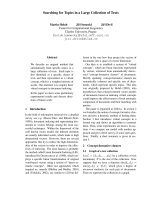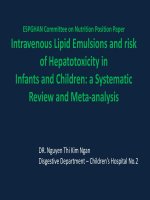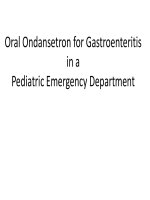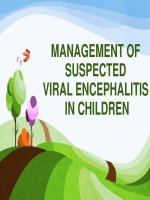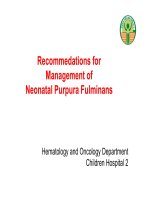Oral Ondansetron for Gastroenteritis in a Pediatric Emergency Department | Website Bệnh viện nhi đồng 2 - www.benhviennhi.org.vn
Bạn đang xem bản rút gọn của tài liệu. Xem và tải ngay bản đầy đủ của tài liệu tại đây (384.55 KB, 13 trang )
Oral Ondansetron for Gastroenteritis
in a
Pediatric Emergency Department
Background
Vomiting limits the success of oral rehydration in children with gastroenteritis. We
conducted a double-blind trial to determine whether a single oral dose of
ondansetron,an antiemetic, would improve outcomes in children with
gastroenteritis
Methods
We enrolled 215 children 6 months through 10 years of age
who were treated in a pediatric emergency department for
gastroenteritis and dehydration. After being randomly
assigned to treatment with orally disintegrating
ondansetron tablets or placebo, the children received oralrehydration therapy according to a standardized protocol.
The primary outcome was the proportion who vomited
while receiving oral rehydration. The secondary outcomes
were the number of episodes of vomiting and the
proportions who were treated with intravenous rehydration
or hospitalized.
The authors of a meta-analysis (163) of 6 RCTs
found that ondansetron therapy decreased the
risk of persistent vomiting, reduced the need for
IV fluids, and decreased the risk of immediate
hospital admission in children with vomiting as a
result of gastroenteritis; however, compared with
placebo, ondansetron significantly increased
stool outputs in treated patients, and it did not
affect return to care.
A more recent Cochrane review (164) included 7 RCTs
that compared ondansetron therapy with placebo and 4
of these investigated oral route of administration.
Children age <18 years who presented with vomiting
and had a clinical diagnosis of gastroenteritis were
enrolled. Compared with placebo, ondansetron
significantly increased the proportion of children with
cessation of vomiting, and reduced the need for IV
therapy and the immediate hospital admission rate. In
3 RCTs, there was a significantly increased rate of stool
outputs in the ondansetron group (P<0.05). A critical
overview of data available in the Cochrane database of
systematic reviews showed that children who received
oral ondansetron had lower hospital admission rates to
ED compared with placebo and lower risk of receiving
IV rehydration (140).
Only the Canadian Pediatric Society (165) has
recommended that oral ondansetron therapy, as
a single dose, be considered forchildren from 6
months to 12 years of age with vomiting related
to suspected AGE, and who have mild-tomoderate dehydration or who have failed oral
rehydration therapy. The use of ondansetron was
not recommended in children with AGE
predominantly presenting as moderate-to-severe
diarrhea because one of the most common
adverse effects of ondansetron is increased
frequency of diarrhea.

